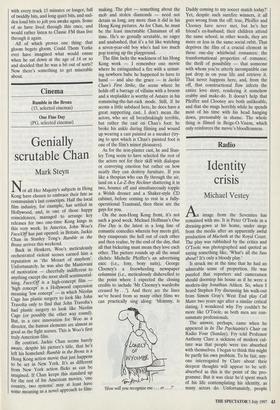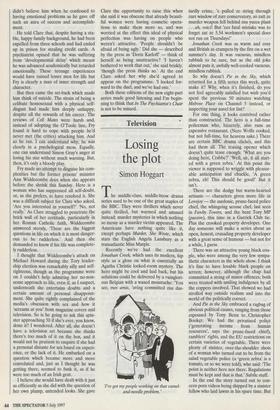Radio
Identity crisis
Michael Vestey
Ai image from the Seventies has remained with me. It is Peter O'Toole in a dressing-gown at his home, under siege from the media after an apparently awful production of Macbeth at the Royal Court. The play was rubbished by the critics and O'Toole was photographed and quoted as saying something like, 'What's all the fuss about? It's only a bloody play.'
It struck me at the time that he had an admirable sense of proportion. He was puzzled that reporters and cameramen should doorstep his house as if he were a modern-day Jonathan Aitken. So, when I heard Stephen Fry discussing his walk-out from Simon Gray's West End play Cell Mates two years ago after a similar critical slating, I wondered why Fry couldn't be more like O'Toole, as both men are con- summate professionals.
The answer, perhaps, came when he appeared in In The Psychiatrist's Chair on Radio Four (Sunday). Fry told Professor Anthony Clare a sickness of modern cul- ture was that people were too absorbed with themselves. I began to think this might be partly his own problem. To be fair, any- one interrogated by Clare about their deepest thoughts will appear to be self- absorbed as this is the point of the pro- gramme. But it was clear he'd spent much of his life contemplating his identity, as many actors do. Unfortunately, people didn't believe him when he confessed to having emotional problems as he gave off such an aura of success and accomplish- ment.
He told Clare that, despite having a sta- ble, happy family background, he had been expelled from three schools and had ended up in prison for stealing credit cards. A psychiatrist opined that he was suffering from 'developmental delay' which meant he was advanced academically but retarded emotionally. These teenage experiences would have ruined lesser men for life but Fry is clearly a man of inner strength and character.
But then came the set-back which made him think of suicide. The strain of being a celibate homosexual with a physical self- disgust had made him deeply unhappy, despite all the rewards of his career. The reviews of Cell Mates were harsh and, instead of adopting the O'Toole line, Fry found it hard to cope with people he'd never met (the critics) attacking him. And so he ran. I can understand why; he was clearly in a psychological mess. Equally, one can understand Simon Gray's anger at losing his star without much warning. But, then, it's only a bloody play.
Fry made no attempt to disguise his com- plexities but the former prisons' minister Ann Widdecombe does when she appears before the shrink this Sunday. Here is a woman who has suppressed all self-doubt, or, as she prefers, to have resolved it. She was a difficult subject for Clare who asked, `Are you interested in yourself?"No, not really.' As Clare struggled to penetrate the brick wall of her certitude, particularly in her Roman Catholic faith, Widdecombe answered sternly, 'These are the biggest questions in life on which it is most danger- ous to be rudderless.' And then she demanded to know if his life was complete- ly rudderless.
I thought that Widdecombe's attack on Michael Howard during the Tory leader- ship election was remarkably silly and self- righteous, though as the programme wore on I couldn't help admiring her no-non- sense approach to life, even if, as I suspect, underneath she entertains doubts and a certain amount of personal disappoint- ment. She quite rightly complained of the media's obsession with sex and how it `screams at you' from magazine covers and television. So is he going to ask this spin- ster approaching 50 if she's ever, you know, done it? I wondered. After all, she doesn't have a television set because she thinks there's too much of it on the box, and it would not be prurient to enquire if she had a personal distaste for sex based on experi- ence, or the lack of it. He embarked on a question which became more and more convoluted and, just as I thought he was getting there, seemed to funk it, as if he were too much of an Irish gent.
I believe she would have dealt with it just as efficiently as she did with the question of her own plump, untended looks. She gave Clare the opportunity to raise this when she said it was obscene that already beauti- ful women were having cosmetic opera- tions to make them more so, and was worried at the effect this ideal of physical perfection was having on people who weren't attractive. 'People shouldn't be afraid of being ugly.' Did she — described by the press as 'Doris Karloff' — think of herself as being unattractive? 'I haven't bothered to work that out,' she said briskly, `though the press thinks so.' At the end Clare asked her why she'd agreed to appear on the programme. 'I looked for- ward to the duel, and we've had one.'
Both these editions of the new eight-part series made good listening and I'm begin- ning to think that In The Psychiatrist's Chair is not to be missed.



























































 Previous page
Previous page